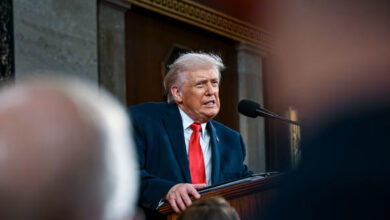One of several changes in Egyptian society that can no longer be overlooked and which has grown over the past few years is a phenomenon which I have dubbed the "comeback of politics." By that I mean the involvement of ordinary citizens in political activity.
The popular reception of ElBaradei upon his arrival at Cairo International Airport on Friday proves my point. What amazed me most was not the presence of political leaders but the presence of considerable numbers of ordinary citizens who came from all over the country to welcome ElBaradei and to express support, despite fears of possible conflicts with security forces.
This phenomenon represents a historic development in Egyptian political life since the 1952 revolution. If the current Egyptian regime–whose roots and basic features date back to the fifties–is withering away, then the flip side of this phenomenon is the involvement of ordinary citizens in political life. Admittedly, though, such involvement is still slow and at an embryonic stage in development.
The 1952 revolution "stripped" Egyptian society of politics, putting it exclusively in the hands of the ruling elite. This was achieved through a ban on political parties, government and security control over civil society and the nationalization of the press.
Some may question this statement, though. They will say that there was a great deal of political energy and enthusiasm, especially during the Nasserist era. They will mention the nationalization of the Suez Canal, the tripartite attack in 1956, the construction of the High Dam, and the union between Egypt and Syria. They are right. But in the world of politics as well as in political science, such actions are termed "political mobilization." The term denotes all efforts exerted by the political regime to mobilize citizens; morally through intense political propaganda via the media and the press, and institutionally through the presence of a single political organization.
With a political system as such, the citizens don’t participate in politics. In fact, it’s the other way around: the regime uses its citizens and shapes them for political ends. The citizens don’t speak, they listen. They don’t object, they only cheer. Some of the researchers who examined the Egyptian political system in the fifties and sixties called it an "apolitical regime," whereby the ruling elite exclusively monopolize politics as the people–cleverly mobilized by the regime–cheer in support. It’s therefore not surprising to see such a regime abolish parties, which people have invented as a means to engage in politics.
But the "political mobilization" of yesterday is entirely different from today’s phenomenon of "political participation," whose features started to appear in the last decade and which has reached its apex with the popular reception of ElBaradei. Politics has returned to Egyptian public life, no longer being monopolized by a single party. Today, political parties, syndicates, associations, and other protest movements–such as Kefaya and 6th April–are engaged in political life.
Citizens are engaging in politics voluntarily, not forced by government institutions or the ruling party. The voluntary nature of participation sets today’s form of political involvement apart from the political mobilization of the past. What’s more, this form of engagement sometimes involves taking some risks.
The citizen who joins an opposition party or takes part in a demonstration knows beforehand that (s)he can be arrested or face trouble that can jeopardize his/her work, especially with State Security forces infiltrating all realms of life.
A large percentage of citizens participating in those activities are "ordinary" citizens, many of whom never joined a political party or organization before. In fact, some of them are going into politics for the first time. Clearly, the ordinary Egyptian citizen is starting to see the link between day-to-day problems–including problems with transport, household expenditures, housing, health care, pollution–and the credibility of the political regime.
Differently put, the long-standing idea that Egyptian citizens’ preoccupation with making a livelihood has prevented them from being interested in political life is, in fact, changing. Those daily concerns are themselves pushing people to get immersed in politics to better their living conditions.
As a result, we have started to see government employees and farmers staging protests and sit-ins and engaging in other forms of organized protest. The fact that those protests are restricted to professional or sectarian demands does not undermine their political significance however. Those demands are still a test of the regime’s ability to carry out its political functions.
The most remarkable development brought about by the return of politics to public life is the role played by the youth.
The youth are playing a major role in this process, using highly advanced means of communication, especially the internet. The internet has provided them with new ways of communication as well as a forum to express popular opinions here and abroad.
The internet would have had much less of an impact had those youth not had a high level of political awareness, a sense of responsibility and a concern for their future–which is essentially entwined with that of their country.
Several of these youth are ready to pay the price: putting their own lives in danger in order to improve Egypt for them and their children.
It’s true that many young leaders and movements are lacking in experience, but that should not minimize the value of the phenomenon they represent, which has enriched Egyptian political life and revitalized it like never before.
Translated from the Arabic Edition.
Opinion




